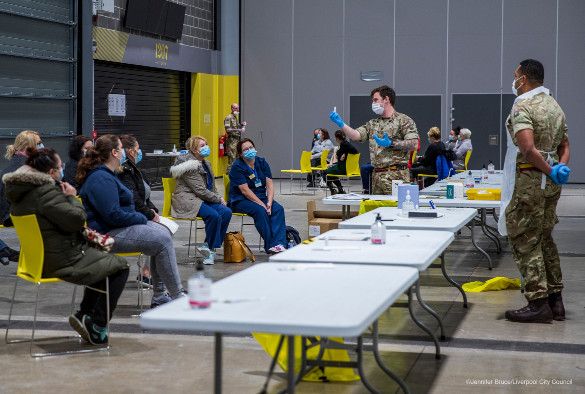Image credit: Liverpool City Council
The collaborative efforts of those working as part of the Cheshire and Merseyside Integrated Care System, the University of Liverpool, and One Liverpool Partnership have been highly commended at the HSJ Awards 2022 for using data to connect services.
The CIPHA (Combined Intelligence for Population Health Action) project has developed a civic blueprint aimed at helping to close the gap between data and action for better health and care.
The blueprint takes into account world-leading impacts and lessons learnt as part of Cheshire and Merseyside’s response to the Covid-19 pandemic through bringing a variety of stakeholders together to share data and work cooperatively to enable positive change in health and wellbeing. It also explores how this shared data can be used at scale to help respond more effectively to complex pressures on health systems, spot patterns and trends (like health conditions or success rates for treatment outcomes), and manage healthcare resources (like care professionals, medicine administration, and service provision). In addition, it links population health management intelligence with the workflows of everyday health and social care for individual patients/residents, can highlight opportunities for prevention and precise targeting of services, as well as shining a light on how services can be improved further.
The blueprint also acknowledges the important role that the public play in supporting public health initiatives that help their communities to respond more effectively to outbreaks, such as the world’s first city-wide voluntary Covid-19 rapid antigen testing scheme, the Liverpool Covid-SMART (systematic, meaningful, asymptomatic, repeated testing) pilot to save lives and livelihoods. This used CIPHA data to inform Cheshire and Merseyside’s response to the Covid-19 pandemic, to analyse the geographic and socio-demographic uptake of testing in real-time and help guide changes to testing deployment and communications/engagement. This approach was associated with reducing hospital admissions with Covid-19 by at least a quarter and reopening Liverpool’s economy and social events when all surrounding areas were locked down. This became the playbook for Covid testing for the rest of the UK and many parts of the world.
Speaking about being part of the highly commended ‘team of teams’ Brigadier Joe Fossey OBE, Commander of the British Army’s 8th Engineer Brigade which supported the Liverpool Covid-SMART operation said: “The importance of actionable data, which is defined as information designed to prompt or to suggest an action, is critically important in underpinning trust in those in emergency situations. As when resources are scarce, and time can mean the difference between life and death, being armed with highly accurate and timely intelligence, can have a profound impact on decision making. And in the fight against Covid-19, I’d say that CIPHA certainly was that weapon for the people of Cheshire and Merseyside. As it helped to connect those supporting the pandemic response, who weren’t necessarily used to working together on a day-to-day basis or speaking the same language. By pulling different data streams together in one place, so that all parties had a joint understanding of the reasons for making certain decisions, which helped to drive the project forward and empowered us to target testing where it was needed most. Helping to protect not just lives, but also livelihoods that were affected by local lockdowns”.
Iain Buchan, Professor of Public Health and Clinical Informatics at the University of Liverpool, who designed CIPHA and led the Liverpool Covid-SMART pilot evaluation, said: “Liverpool’s people and services displayed characteristic generosity of spirit and grit in response to Covid-19. Deployment of near real time intelligence from linked NHS, social care and public health testing data in just 90 days was a remarkable achievement of itself. Then to bridge the gap between the data systems and community-wide actions, delivering world-first evidence about testing and safe reopening of events was remarkable. The teamwork and infrastructure legacy of this work is now the engine-room of intelligence-led innovation for Cheshire & Merseyside’s Integrated Care System. A blueprint for impact by bridging the data-action gap from the side of action.”
Matthew Ashton, Director of Public Health for Liverpool added: “The role that the people of Liverpool played in this work cannot be underestimated, with over 120,000 residents coming forward for mass asymptomatic testing in November/December 2020. Residents, who helped to protect themselves and those around them, but also enabled Liverpool and the wider city region to become the first area in the country to move down from Tier 3 to Tier 2 when lockdown ended, with many businesses able to reopen for the first time in two months. And thanks to their efforts, Liverpool went onto be chosen to support the national Events Research Programme in building a Covid safety net that allowed events to reopen in a safe and controlled manner. That said, this high commendation award is also for the people of Liverpool for their efforts as well as their public spirit, and who I’d like to thank, because they helped to make a real difference to us tackling the pandemic, not just in Cheshire and Merseyside, but across the whole of the country too”.
